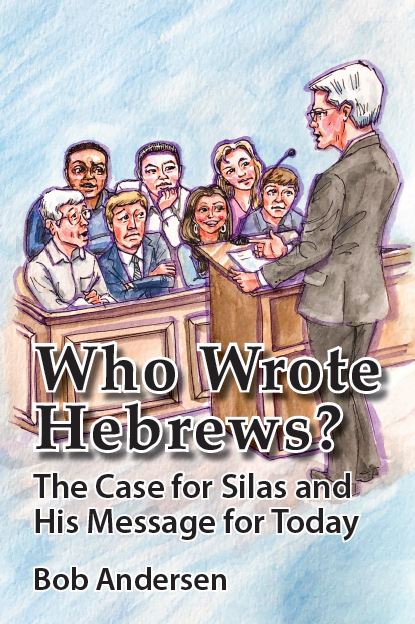New Release March 2023
Silas Wrote Hebrews
This is not another commentary on Hebrews. It is an analysis of the setting–which shines a beacon on the message. Pinpointing the author, historical setting, and target audience make the urgency of the message clear—not only for the ancient Hebrews but for Christians today. It is an argument for Silas as author with evidence that was “hidden in plain sight.” It shows Hebrews was written to Jerusalem. It is a defense against 20th century thought and shows Paul’s involvement in the writing of the book of Hebrews.

A Word From The Author
“This isn’t going away. I think you’re just going to have to write it.” That’s what my wife Roxann said to me after I’d wondered (many times aloud) who wrote Hebrews and why. I’d studied the arguments for Pauline authorship—then that of Apollos, Barnabas, Luke, Aquila and Priscilla. None of them fit all the clues. Some of them violated biblical evidence. I read the modern theories that Hebrews was written to a house church in Rome. But it didn’t make sense that such an extensive and superbly-crafted treatise on the superiority of the new covenant over the old covenant and the importance of not turning back from the faith given by God on Mount Sinai would be written only to a few transplanted Jewish believers in an unknown church or unknown small Jewish churches far away in Rome.
I’ve been an attorney for forty years, so when my wife told me I should “write it up,” I began assembling the evidence. What were the available clues? The longer I looked, the more clues I found. The New Testament provided most of the crucial clues. Church historians filled in some of the historical gaps and provided a context for the story and reason for writing.
In a criminal trial, the prosecuting attorney makes an opening statement. He paints a picture of the facts he believes he can prove for the jury. The opening statement is not the evidence. It is the roadmap for the evidence that will come later. The jury evaluates each piece of evidence as it is presented to see if they think it fits his roadmap.
You be the jury. Chapter 1 is the opening statement. Some parts of my story are widely accepted; others are controversial. Get a feel for the background and characters of Hebrews. Don’t judge my argument after the first chapter. The evidence comes in subsequent chapters. Examine it then—piece by piece—and see if you are convinced by the case I make.
I hope you enjoy following along as you consider the evidence and contemplate the 1950–year-old mystery of who wrote Hebrews, its setting, purpose, and message—both for the original audience and for Christians today.![]()
Bob Andersen
What Readers Are Saying




